
Albert Millaud was a French journalist, writer and stage author, born in Paris, 13 January 1844, and died in the same city on 23 October 1892. [1]

Albert Millaud was a French journalist, writer and stage author, born in Paris, 13 January 1844, and died in the same city on 23 October 1892. [1]
He was the son of the banker Moïse Millaud, the founder of Le Petit Journal . [2]
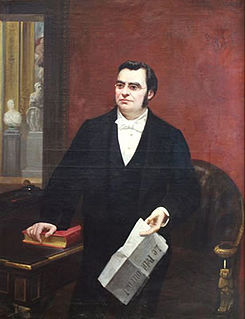
Moses Polydore Millaud, Moïse Polydore Millaud, was a journalist, banker and entrepreneur who founded Le Petit Journal, at one time the leading newspaper in France.

Le Petit Journal was a conservative daily Parisian newspaper founded by Moïse Polydore Millaud; published from 1863 to 1944. Together with Le Petit Parisien, Le Matin, and Le Journal, it was one of the four major French dailies. In 1890, during the Boulangiste crisis, its circulation first reached one million copies. Five years later, it had a circulation of two million copies, making it the world's largest newspaper.
He studied law (obtaining his doctorate in 1866), [1] but turned his energies to literature and in 1865 published a volume of poetry entitled Fantaisies de jeunesse.
Under the pseudonym Oronte, he wrote articles for La Gazette de Hollande and La Revue de poche which he founded with Abel d’Avrecourt.
For his daily articles in Le Figaro , where he covered parliamentary affairs, he also used the pseudonyms [3] La Bruyère, Saint-Simon, Paul Hémery, Lafontaine and Baron Grimm.

Le Figaro is a French daily morning newspaper founded in 1826 and published in Paris. Le Figaro is the oldest national daily in France and is one of the three French newspapers of record, along with Le Monde and Libération.
Millaud's first play, written in 1872, was Le Péché véniel. He was the author of the libretto for several opérettes for Jacques Offenbach, Charles Lecocq and Hervé. He married the singer Anna Judic, [4] for whom he wrote Lilli, Niniche, La Roussotte, La Femme à papa and most memorably Mam'zelle Nitouche (in collaboration with Henri Meilhac).

Jacques Offenbach was a German-French composer, cellist and impresario of the romantic period. He is remembered for his nearly 100 operettas of the 1850s–1870s and his uncompleted opera The Tales of Hoffmann. He was a powerful influence on later composers of the operetta genre, particularly Johann Strauss, Jr. and Arthur Sullivan. His best-known works were continually revived during the 20th century, and many of his operettas continue to be staged in the 21st. The Tales of Hoffmann remains part of the standard opera repertory.

Alexandre Charles Lecocq was a French composer, known for his opérettes and opéras comiques. He became the most prominent successor to Jacques Offenbach in this sphere, and enjoyed considerable success in the 1870s and early 1880s, before the changing musical fashions of the late 19th century made his style of composition less popular. His few serious works include the opera Plutus (1886), which was not a success, and the ballet Le cygne (1899). His only piece to survive in the regular modern operatic repertory is his 1872 opéra comique La fille de Madame Angot. Others of his more than forty stage works receive occasional revivals.

Hervé, real name Louis Auguste Florimond Ronger, was a French singer, composer, librettist, conductor and scene painter, whom Ernest Newman, following Reynaldo Hahn, credited with inventing the genre of operetta in Paris.
He became a chevalier de la Légion d'honneur in 1877.

Henri Meilhac was a French dramatist and opera librettist.
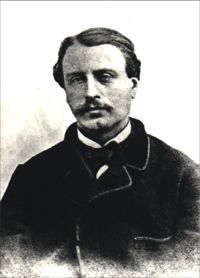
Mam'zelle Nitouche is a vaudeville-opérette in three acts by Hervé. The libretto is by Henri Meilhac and Albert Millaud. This story of a respectable musician, transforming himself into a songwriter at night, is partly inspired by the life of the composer of the piece Hervé, who as Florimond Ronger, his real name, was the organist at the important church of Saint-Eustache, Paris by day and wrote the music for and starred in satirical, irreverent operettas under a stage name at night.
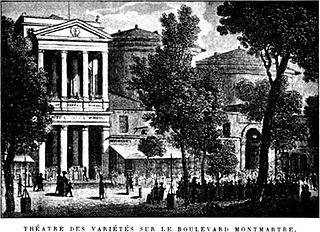
The Théâtre des Variétés is a theatre and "salle de spectacles" at 7-8, boulevard Montmartre, 2nd arrondissement, in Paris. It was declared a monument historique in 1975.
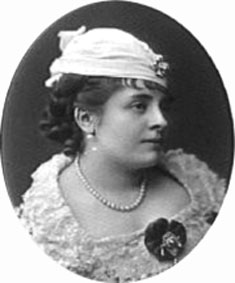
Anne Marie-Louise Damiens, stage name Anna Judic was a French comic actress. Her ménage à trois proved the inspiration for that in the 1880 Émile Zola novel Nana.
Joseph-Lambert Dupuis was a Belgian singer and actor. He was principally active in opéra-bouffe in Paris, in particular at the Théâtre des Variétés.
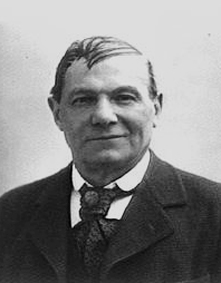
Louis Baron,, stage name Baron, was a French actor and singer (bass), born in September 1838 at Alençon, died in 1920.

Édouard-Théodore Nicole, known as Léonce, was a 19th-century French actor and singer.
Alfred Hennequin was a Belgian dramatist who had a successful career as a writer of comedies. He is recognised as one of the innovators in the genre of farce. Georges Feydeau, whose name is synonymous with French farce, publicly acknowledged his debt to Hennequin. He was also the father of the famous French playwright Maurice Hennequin.
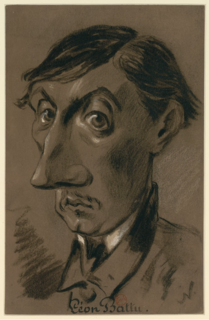
Léon Battu was a French dramatist, born 1829 in Paris, where he died on 22 November 1857.
Alfred Delacour or Alfred-Charlemagne Delacour, real name Pierre-Alfred Lartigue, was a 19th-century French playwright and librettist.
Adolphe Jaime, called Jaime fils, was a 19th-century French vaudevillist and librettist. He was the son of Ernest Jaime (1804-1884), also a playwright.
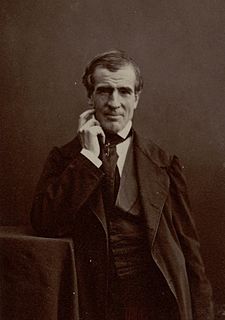
Pierre Michel Delaporte was a 19th-century French playwright, painter, lithographer and political caricaturist.

Gil-Pérès, real name Jules-Charles Pérès Jolin, was a 19th-century French stage actor and vaudevilliste, who was a member of the troupe of the Théâtre du Palais-Royal in Paris in the mid-19th century, and created several roles in Offenbach operettas.

Alfred Duru was a 19th-century French playwright and operetta librettist who collaborated on more than 40 librettos for the leading French composers of operetta: Hervé, Offenbach, Lecocq and Audran.
Fabrice Carré or Carré-Labrousse, real name Jules Fabrice, was a 19th-century French playwright, and librettist. The dramatist Fabrice Labrousse (1806-1876) was his grandson.
Albert de Saint-Albin was a 19th-century French playwright, journalist, chansonnier and librettist.
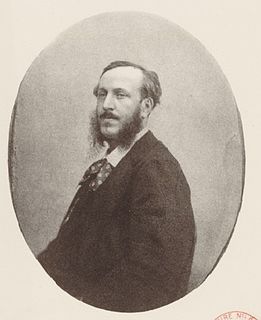
Edme Jules called Jules Costé, was a 19th-century French lawyer and composer of operettas and opéras-comiques.

Maria Conchita Gélabert (1857–1922) was a lyrical artist and actress of Spanish origin who performed in France at the end of the 19th century.

Amélie Diéterle was a French actress and opera singer. She was one of the popular actresses of the Belle Époque until the beginning of the Années Folles. Amélie Diéterle inspired the poets Léon Dierx and Stéphane Mallarmé and the painters Auguste Renoir, Henri de Toulouse-Lautrec and Alfred Philippe Roll.